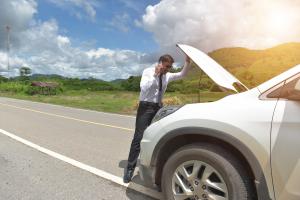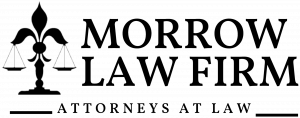Vehicle Recall Liability in Louisiana: Legal Considerations After an Accident
If a recalled defect plays a role in causing an accident, manufacturers, dealerships, and even service providers may bear some responsibility”
OPELOUSAS, LA, UNITED STATES, April 1, 2025 /EINPresswire.com/ -- Vehicle recalls are issued when manufacturers or regulators determine that a vehicle or one of its components poses a safety risk. These recalls can involve anything from faulty brakes and steering systems to defective airbags or electrical malfunctions. When an accident occurs involving a recalled vehicle, the question of liability becomes more complex than in a typical auto collision.— William P. Morrow
William P. Morrow, an attorney at Morrow Law Firm in Opelousas, Louisiana, explains that liability in these cases can extend beyond the vehicle owner or driver. “If a recalled defect plays a role in causing an accident, manufacturers, dealerships, and even service providers may bear some responsibility,” said Morrow. The firm is led by William P. Morrow, John Michael Morrow, Jr., and Stephen M. Morrow.
Understanding how liability is assigned requires analyzing whether the recall was properly communicated and whether reasonable steps were taken to repair or address the defect. In some cases, the owner may have received multiple notices about the recall but failed to take action. In others, a recall may have been issued after the accident occurred, making the manufacturer a potential party in the legal proceedings.
In Louisiana, product liability law applies to vehicle defect claims. The Louisiana Products Liability Act (LPLA) outlines the basis upon which a manufacturer can be held liable. These include design defects, manufacturing defects, and failure to provide adequate warnings or instructions. When a recall is issued, it typically falls under the failure-to-warn or defective design categories.
Vehicle owners are usually notified of recalls via mailed notices from the manufacturer or the National Highway Traffic Safety Administration (NHTSA). If the vehicle is sold or transferred, this information may not reach the current owner. While lack of awareness does not automatically absolve an owner from responsibility, it can complicate the analysis of fault.
Accidents involving recalled vehicles require thorough investigation. Determining whether the defect directly contributed to the crash is essential. For example, a vehicle that veers off the road due to a faulty steering component presents a different scenario than a collision caused by distracted driving where the defect was unrelated.
Another factor in liability is whether the recall repair was attempted but performed improperly. In such instances, a dealership or third-party mechanic may be liable if the fix did not meet manufacturer or industry standards. Documentation of service history and communication with repair shops becomes crucial evidence in these claims.
Louisiana operates under a comparative fault system. If multiple parties share fault in a vehicle recall-related accident, each may be assigned a percentage of liability. This includes the driver of the vehicle, the manufacturer, a dealership, or other involved parties. Damages awarded to the injured party may be reduced based on their percentage of fault.
Insurance coverage in these cases also presents challenges. Many policies do not exclude coverage for accidents involving recalled vehicles, but some may attempt to limit coverage if the defect was known and unaddressed. Insurers may also seek subrogation against manufacturers if a defect contributed to the damages.
Timely legal action is necessary due to Louisiana’s one-year prescriptive period for personal injury claims. If an injured party fails to file within this time frame, the right to seek compensation may be lost. This makes early evaluation of the role of a vehicle recall critical to protecting legal rights.
In some cases, a class-action lawsuit may already be pending against the manufacturer for the specific defect. Joining such a class may limit individual recovery options, so it is important to consider whether pursuing an independent claim is more appropriate given the circumstances and damages involved.
Legal professionals reviewing vehicle recall cases must also monitor updates from the NHTSA and manufacturers. A newly issued recall may change the scope of liability or introduce new evidence supporting a defective product claim. Keeping current with recall databases and service bulletins can help substantiate causation and accountability.
Manufacturers are held to a standard of reasonable care when it comes to public safety. Once a defect is discovered, the timeline and adequacy of their response are critical in determining whether negligence occurred. Delay in issuing a recall or failure to implement an effective remedy can shift a significant portion of liability to the manufacturer.
Finally, expert testimony is often needed to prove that a defect caused or contributed to an accident. Engineers, mechanics, or accident reconstruction specialists may be called upon to demonstrate how the failure of a recalled part led to loss of vehicle control or contributed to the severity of the crash.
Morrow Law Firm remains committed to analyzing these claims with precision and thoroughness. Whether representing injured drivers, passengers, or third parties affected by an accident involving a recalled vehicle, the firm ensures that each case is evaluated based on evidence, applicable statutes, and case law precedent.
For more information about vehicle defect claims and product liability law in Louisiana, or to request a consultation regarding a recent accident involving a recalled vehicle, contact Morrow Law Firm at their Opelousas location.
Morgan Thomas
Rhino Digital, LLC
+1 504-875-5036
email us here
Visit us on social media:
Facebook
Legal Disclaimer:
EIN Presswire provides this news content "as is" without warranty of any kind. We do not accept any responsibility or liability for the accuracy, content, images, videos, licenses, completeness, legality, or reliability of the information contained in this article. If you have any complaints or copyright issues related to this article, kindly contact the author above.


